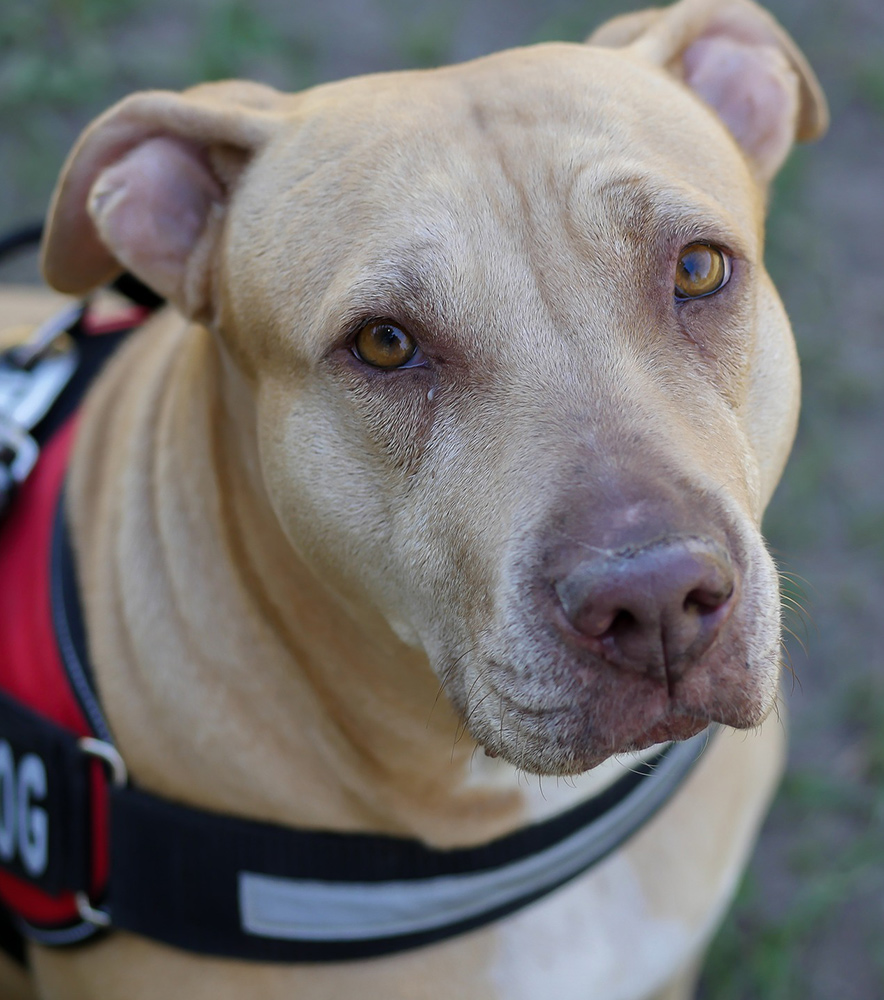Archive for the ‘Service Dog Tips’ Category
There’s nothing that dogs love more than being outside in nature, so you may find yourself one day planning a trip to a National Park with your service dog. Before you start your plans, you may want to plan. Knowing the natural environment and what rules and laws apply to your service dog can make your trip less stressful and much more pleasurable in the long run.
It’s important to know that federal laws prevent restrictions on service animals, even in national parks. However, there may be other restrictions that apply under certain conditions. For example, a service dog may be permitted in a national park but not allowed on trails that may endanger wildlife or other people.
The Right Gear for Your Service Dog When Visiting National ParksThe type of protection and gear you bring with you can keep you and your dog safe on your journey. Your service dog may be a hero but still needs protection from the weather and terrain. Prepare for the appropriate climate and environmental needs of your service dog.
For example, desert areas are beautiful but can be dangerous if you’re not prepared. Desert trips often require special dog boots to keep your service dog’s paws from burning on the hot ground. Dogs with thin fur or exposed skin may need doggy sunscreen or a covering. Most of all, extra water and food are always necessary for the desert due to the risk of dehydration.
A winter trip or hike in a national park have their own considerations. Dogs that don’t have thick fur often need extra coverings and boots or may not tolerate the cold at all.
Whenever you take a trip—to a national park or eslewhere—a first aid kit for you and your service dog is always a must.
Service Animal Permits and Rules in National ParksSome national parks may be required a permit for your service dog. These permits allow the park to keep tabs on your presence for the safety of you and your service animal. For example, Yellowstone National Park requires such a permit for service dogs.
Many national parks require service dogs to be leashed, pet food to be stored appropriately, and feces properly disposed of. These rules must be obeyed and are meant to keep visitors safe and to preserve the surrounding wildlife.
With a little preparation you can visit any national park with your service dog, like Grand Teton National Park in Wyoming. Caping Your Service DogAlthough you won’t be required to cape your dog at a national park, it’s still a good idea to do so. By placing an easily identifiable service dog cape on your canine, a park ranger can spot your dog right away—even through binoculars. It will keep your dog safe, inform park employees, and show other park goers that your service dog is on the job.
Service Dog Vest Size Chart National Park Access Pass and Your Service DogA National Park Access Pass is an excellent option; it gives you free, lifetime admission to national recreation sites, including all the National Parks Service parks. The pass is available to citizens and permanent U.S. residents who have a permanent disability or activity limitations. The disability does not have to be 100% but does need to impede on a significant life activity, such as grooming, working, learning, or speaking. Although the Access Pass itself is free, a processing fee of ten dollars is required.
For people with service dogs, an Access Pass identifies you as a service dog owner to National Park Service employees and allows you to be with your service dog without disputes. An Access Pass not only provides free access to National Parks but ensures that your service dog can remain by your side with fewer interruptions.
Denial of Access of a Service Dog in National ParksBecause the general public is allowed access to national parks, you and your service dog are also allowed access. Unfortunately, you may encounter a park employee who might be unfamiliar with federal disability laws, and they may deny you and your service dog access. If you’re denied access to a park because of your service dog, you can file a complaint here.
Enjoying the National Parks With Your Service DogYour disability doesn’t prevent you from enjoying the National Parks, especially if you have a service dog. However, your service dog is also your responsibility. You may come across other visitors, as well as park employees, and so your service dog must remain well-behaved at all times. What’s more, parks commonly require leashes on service dogs, both for the dog’s safety and wildlife safety. But with a little planning, you and your service dog can explore the great outdoors safely together.
Trying to determine if a dog is a service dog can feel like a game of Twenty Questions, but there’s only really two questions a business owner is allowed to ask:
Is the dog a service animal required because of a disability? What work or task has the dog been trained to perform?As cryptic and frustrating as that sounds, these parameters are present for good reasons. They protect the personal privacy of the service dog’s handler. In addition, the Americans with Disabilities Act protects the rights and privacy of individuals with disabilities, thus also protecting the right of a service dog to perform their task. In short, owners of service dogs have federal rights. Because of these federal protections, the public should be aware of the appropriate way to verify a service dog.
What is a Service Dog?According to the Americans with Disabilities Act (ADA), a service dog is trained to complete a task directly relating to their owner’s disability. A service dog is not a pet but a way for a disabled person to overcome their disability. Because service dogs affect their owners’ health and welfare, they’re allowed into areas where pets aren’t typically welcome. Some examples of service dog tasks are:
Alert people with hearing impairments. Identify impending seizures. Help people with mobility problems. What Can You Ask a Service Dog Owner?As stated prior, there are two questions a business can ask a service dog owner when trying to verify a service dog:
Is the dog a service animal required because of a disability? What work or task has the dog been trained to perform?Though other questions may seem relevant, they can be considered intrusive and discriminatory. Here are a few examples of questions that may seem pertinent but infringe on privacy or are discriminatory.
What kind of disability do you have? Can your dog demonstrate what it does for you? Do you have documents to prove that your dog is a service dog? Why does that dog need to be with you in here? Would you be okay without the dog with you?The ADA laws do not require service dogs to be registered, certified, or wear identifying gear such as a vest or ID tag. Therefore, asking for identification or documentation would not establish whether a dog is a service dog.
To verify a service dog, there are only two questions allowed. Asking about the owner’s disability infringes on their privacy. Where is a Service Dog Allowed?Federal laws allow a service dog to go wherever their owner goes. This includes hotels, stores, movies, restaurants, airlines, and anywhere else typically accessible to the public. For example, service dogs can live with their owners in “no-pets allowed” housing due to the federal Fair Housing Act. Service dogs can also travel with their owners in the cabin of airplanes because of the Air Carrier Access Act. These federal laws also exempt service dog owners from any fees for housing, lodging, and travel typically applied to pets.
When Can You Ask a Service Dog to Leave?Almost all service dogs are well-behaved and exceptionally trained, but they’re not always perfect. There are instances when service dogs may be removed from the area. The U.S. Code of Federal Regulations states that there are two reasons a service dog can be asked to leave the premises:
If the service dog’s owner is not able to command the dog, and the dog is out of control. If the service dog isn’t properly housebroken or if the dog urinates or defecates in an inappropriate area.If a service dog does not behave appropriately in public and is required to leave the area for any of the above reasons, the dog’s owner must be allowed to remain without the dog. If the service dog damages property, the business may charge the service dog owner for cleaning after the fact. Surcharges that usually apply to pets don’t apply to a service dog. Additionally, businesses can’t segregate service dogs and their owners from the rest of their patrons.
A real service dog is always under its owner’s control and does not deviate from its tasks. Misrepresentation of Service DogsAlthough there is no federal law that penalizes fraudulent service dog owners, many states have laws against the misrepresentation of a service dog. Nevertheless, people still attempt to pass their pets as service dogs. Service dogs undergo hundreds of hours of training.
Well-trained service dogs are usually not disruptive, unruly, or aggressive. When interacting with the public, service dogs remain focused on their work. They receive training to avoid interactions with others unless necessary because distractions can be dangerous for their owners.
Service dogs do noble and vital work for people who have disabilities. It’s essential to verify service dogs correctly, to adhere to federal laws, and to respect the work that they do.
The Sunshine State allows service dogs to travel, reside with, and perform daily living activities with their owners. The State of Florida aligns with the federal American Disabilities Act (ADA), which provides service dog owners the rights and privacy with their service dogs. These rights cannot be denied, regardless of the local jurisdiction laws or private business ownership rules. Anyone who uses a service dog for their disability in Florida is protected by these laws and are entitled to the use of their animal.
What is a Service Dog?The ADA definition of a service dog is similar to the Florida Statute 413.08 definition. Florida Statute 413.08 defines a service animal as one that is “trained to do work or perform tasks for an individual with a disability… A service animal is not a pet.” These tasks are vital for the quality of life of the person with the disability. For instance, a service dog may help obtain a life-saving medication, guide the visually impaired, or help with mobility issues.
How are Service Dogs Trained?Service dogs must be trained to perform a task that the person with a disability would otherwise be unable to perform themselves. Their training must be specific to the needs of the person with the disability. Service dogs can be trained through a professional canine trainer or by the dog owner themselves.
If a trainer is training the service dog, Florida law allows them the full rights provided to a service dog owner during training sessions. They are allowed into public facilities and transport, just like service dog owners are. This will enable trainers the full ability to train a service dog well.
Identification and Registration Requirements for the State of FloridaAccording to Florida Statute 413.08, documentation that a service animal is trained is not required. Although not mandatory, registration is recommended as it allows easier access to all public accommodations. Having identification and registration available, though not necessary, mitigates any unexpected problems or harassment.
To protect the service dog owner’s privacy, the public can not inquire about the nature of the service animal’s owner’s disability. They may only ask two questions:
Is this a service animal? What task has the animal been trained to perform?Neither business nor private entities may ask personal questions such as:
Asking the owner to have the animals perform their assigned task as a demonstration. Asking the service dog owner declare their illness or disability. Demanding documentation regarding registration or training. Leash Requirements for Service DogsFlorida laws require that a service animal must be under the control of its owner at all times. The service animal must be properly outfitted with supplies such as a leash, harness, or tether. If a leash, harness, or tether interferes with the tasks the dog must perform, then the dog must be under the owner’s control at all times through the owner’s voice or signal commands.
Service Dog Behavior RequirementsAlthough a service dog is essential to their owner’s well-being, both ADA and Florida laws are explicit about their expectations for public safety. These include the following points:
Service dogs must be under the control of the owner at all times. Service dogs can be removed or excluded from an area if the dog is out of control, is not appropriately housebroken, or is a safety issue for the public. Fear of animals or allergies is not a justifiable reason for the exclusion of a service animal. If a service animal must be removed for being a threat, the service dog owner must be provided the option of remaining without the service animal. Damage caused by the service animal is the responsibility of the service animal’s owner.Any person who interferes with these rights may be subject to a misdemeanor of a second-degree in the state of Florida.
In conjunction with federal law, Florida’s state law guarantees full support and protection for you and your service dog. Misrepresentation of a Service DogThe state of Florida considers the misrepresentation of a service dog a second-degree misdemeanor. If a person knowingly presents themselves, in writing, verbally, or through their actions, as having a service dog and do not qualify as such, they may be subject to prosecution.
Public Accommodation for Owners of Service Animals“Public accommodation” is a broad term and, in short, means that people with service animals are allowed anywhere the general public is also invited. For instance, hotels, public transportation, and resorts are examples of areas where service animals are allowed.
Safety of Service Animals in FloridaThe service dog laws for the state of Florida are very similar to the federal regulations. Florida also goes the extra mile to protect its service animals, with laws against any interference or injury. These laws prohibit the obstruction, harm, or intimidation of a service animal by another person or an animal owned by that person. These actions are punishable as a misdemeanor in the first-degree or a felony of the third-degree, depending on the severity of the incident.
Know Your Service Dog Rights and Requirements in FloridaBeing knowledgeable about the rights and requirements of service animals in your state helps keep you and the service animals safe. Respecting the laws, providing the service animals the safe space to do their job, and establishing the correct qualifications can keep the integrity of service dogs intact.







